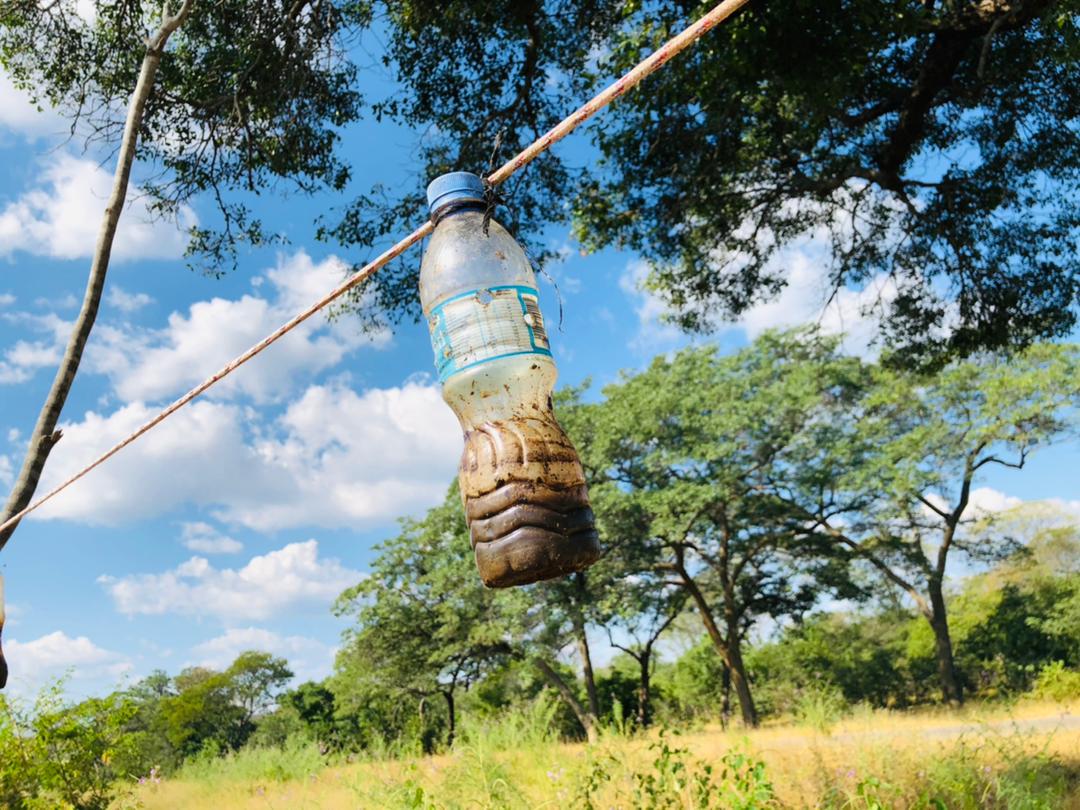Communities in Dete have resorted to using a nonlethal concoction to ward off troublesome elephants which invade their fields.
The concoction consists of a mixture of ingredients such as chillies, ginger garlic, neem leaves, eggs, cow or even elephant dung left to ferment for days.
After fermentation, the concoction is poured into plastic bottles that are then hung around fields.
When elephants attempt to enter the fields, they are welcomed by the strong whiff of the concoction that acts as a repellent.
“The repellent is effective because elephants hate the smell of chillies. Elephants have a strong sense of smell because they smell more than they see and they definitely don’t see eye to eye with chillies. So we have turned the elephants’ strongest sense into their weakest link,” said Ndlelende Ncube, Co-founder and Director of Tikobane Trust, a community conservationist organisation in Dete.
Tikobane Trust has an interest in community development and works with rural communities who share borders with Hwange National Park.
Formed in 2016, Tikobane was registered in 2018 as a trust, teaching conservation to 11 villages in Hwange and Lupane.
“There’s a lot of human and wildlife conflict and poaching happening here. There’s lack of access to information as animals are more recognised than communities, so we want Dete locals to access information,” Ncube said.
To protect community crops from elephants, Tikobane introduced the repellent to Siyalwindi village in January 2021.
“A lot of elephants invade fields where people grow their crops. With climate change, most of the fields don’t have much but elephants destroy crops leaving most families with nothing. Some families then resort to wildlife related crimes such as poaching to survive,” he said.
Tikobane Trust borrowed the repellent idea from an organisation called WildAid from Uganda.
“The repellent has been effective and was tried in Tanzania and Uganda. Our partners in Uganda – WildAid supported us throughout this project, as a community driven solution,” he said.
To start off, villagers mostly women made 800 litres of the repellent.
“We actually used 50 kg of chillies, 20kg of ginger, 20kg of garlic, neem leaves, eggs and dung. Even though the ingredients are harsh on the skin, the women worked tirelessly to pound and mix them. The ingredients were left to ferment for three weeks,” said the conservationist.
When ready, the repellent is poured into small plastic bottles and taken to the fields where it is hung on a linear fence around the community fields.
“Most of the elephants come from the forestry commission land as there is no fence so elephants roam freely crossing over to community fields. Ever since this repellent was put up, not even one elephant has entered the field,” Ncube said.
“However about five to six kilometres away, where there is no repellent, elephants invaded crops leading to three elephants shot in a period of two months. Our repellent not only saves crops but elephants from being shot.”
Tikobane Trust is now looking to expand this project to other villages especially in Lupane and parts of Tsholotsho where there are also challenges of human and wildlife conflict.
“Currently we did only a fence of 1.5 kilometres of the repellent, so in the next farming season we want to target 23 kilometres. This can be done if we other stakeholders come on board,” Ncube said.
Mrs Mkhize, a villager at Dingani Village in Dete, said to make the repellent smell stronger, they perforated the plastic bottles to release more scent.
“My father in law witnessed an elephant approach the field but reverse when it touched the fence. Another time, we saw a herd of elephants approaching our fields and we readied ourselves, even called the rangers but when they came to the repellent, the elephants turned and went elsewhere,” illustrating how effective the repellent was.
“Every time we farm, elephants harvest first. Our husbands no longer slept at home but at the fields chasing elephants because if there was no one, elephants would feast. Now our husbands are sleeping at home and we are sleeping peacefully. Whenever dogs barked at night or we heard any slightest sound we would wake up.”
Thembelihle Dlamini from Tikobane Trust added that the women had started growing some of the ingredients.
“Chillies are one of the easiest crops to grow from home. Buying most of the ingredients was unsustainable as they were expensive, so we are working with communities to start growing chillies, ginger and garlic. We were growing some chillies however at a small scale so we are targeting to grow a lot more, to make this project sustainable. We have also planted neem trees after seven neem trees were donated to us by some stakeholders in Lupane,” she said.
Dlamini noted this programme has assisted in bringing women closer as they shared ideas while producing the repellent.
“Women now have time to do other house chores instead of guarding fields all the time, Recently one villager guarding his field at night was accidentally knocked by a car. So the repellent has also helped people not to sleep in their field. We hope to expand this project to anyone willing to protect the community and elephants,” she said.
Even though they have managed to ward off elephants, the community is now facing a challenge with baboons and other small animals as the repellent only works against elephants.

